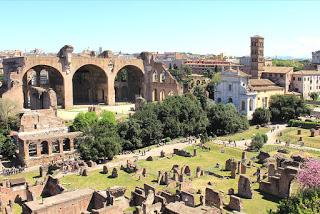
Join Our Rome Tours to Explore Palatine Hill
Rome was built on seven hills, and Palatine Hill is one of the middle ones. Set between some of Rome’s most memorable attractions, like the Colosseum, the Roman Forum, and the Circus Maximus, it boasts a hearty dose of history that dates back thousands of years.
Archaeological digs have proven that people lived on the Hill in the BC era, but there are also strong links to Roman mythology in the area. It’s thought Romulus and Remus were discovered in a cave on Palatine Hill by their mother, and it marks the spot where Romulus decided to build Rome itself.
In that respect, it’s technically the point where the Roman Empire first began.
When the Republican Era of Rome came around, Palatine Hill was an uber fashionable place to live. This was partly because of the incredible views from the vantage point at the top of the hill, and partly because of the clear air that was thought to help residents avoid the diseases carried on the bad air at sea level.
Famous Romans like Augustus, Marc Anthony, and Cicero were all thought to have lived on Palatine Hill, with many later emperors setting up their domains in the area. At one point in time, the entire hillside was awash with pretty imperial palaces, which is how the hill got its name.
Later on in the Middle Ages, the Hill become renowned for its expansive collection of churches and convents before it was bought by Cardinal Alessandro Farnese. He built an ornate botanical garden on top of the many ruins that scattered the hill which can still be seen today.
TheRuinsofPalatineHill
The entirety of Rome is a UNESCO World Heritage Site, and Palatine Hill is smattered with ruins from ancient palaces and other architectural wonders. To the south, you can explore the remains of the Palace of Septimius Severus and the Baths of Septimius Severus.
To the north, there is what’s known as the stadium, which was built alongside the Palace of Domitian which, for more than 300 years, was the largest palace in the city.
The historical charm of Rome is imbued in every single crevice of the city and Palatine Hill is no exception. The sheer amount of history that the hill is home to is incredibly impressive, and a visit there reveals centuries of turbulence and change that has made Rome the city it is today.
For for information about our Rome Tours, please visit: https://www.romecitytour.it/

